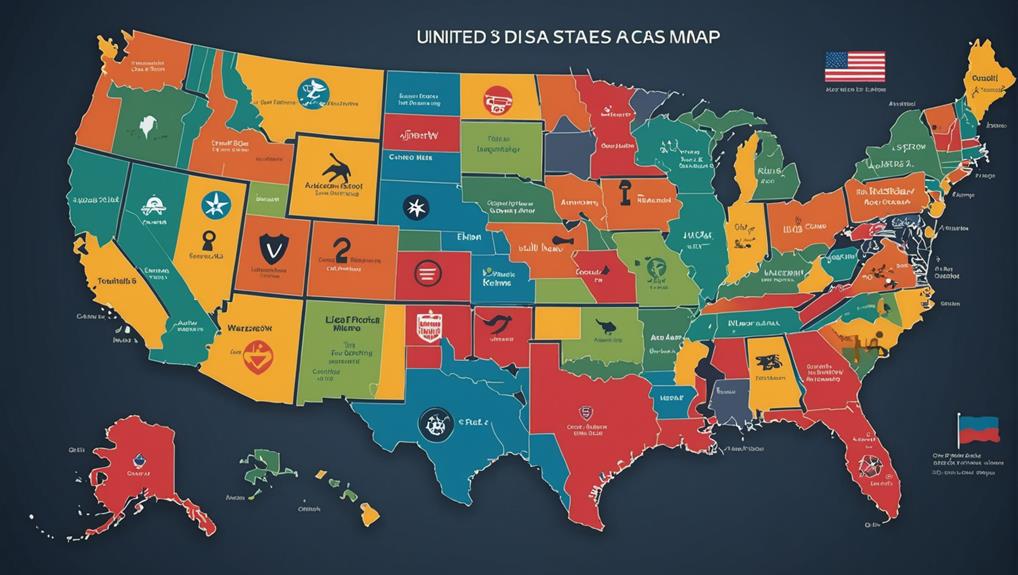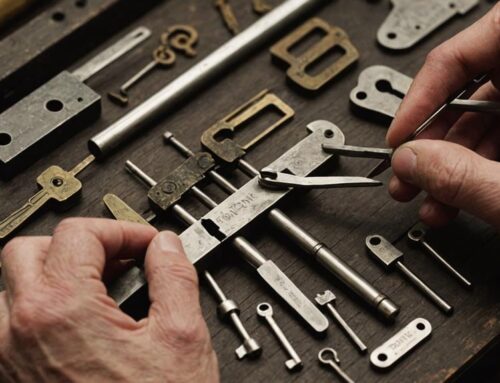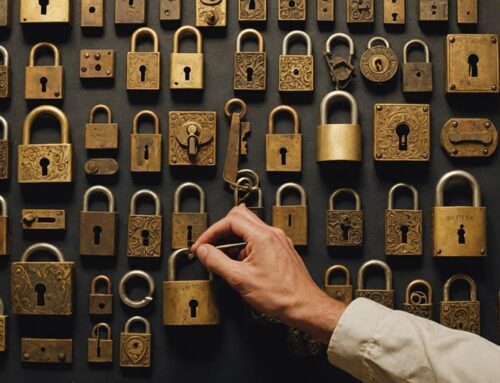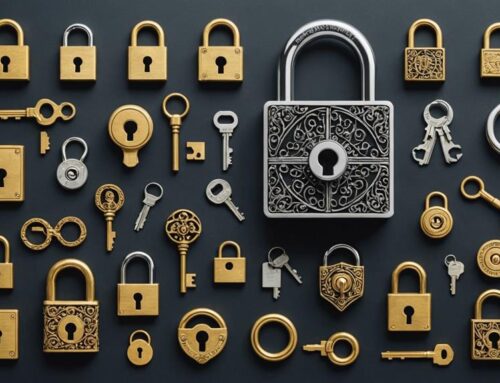Discover the laws regarding lock picking tools in various states such as Alabama, California, Florida, New York, and Texas. Remember, possession of these tools with criminal intent is illegal in many places. Locksmiths and authorized individuals can use them legally. Being aware of these regulations is essential for compliance when it comes to practicing lock picking as a hobby or professionally. Avoid legal consequences by familiarizing yourself with the specific laws in each state. Understanding these guidelines can help protect you from potential penalties and guarantee you stay on the right side of the law.
Key Takeaways
- Possession of lock picking tools for criminal intent is illegal in most states.
- Lock picking is generally legal for licensed locksmiths or with property owner's permission.
- Unauthorized lock picking can lead to criminal charges, fines, and imprisonment.
- Specific laws and regulations vary by state, requiring compliance for legal lock picking activities.
- Understanding state-specific lock picking laws is crucial to avoid legal consequences.
Alabama
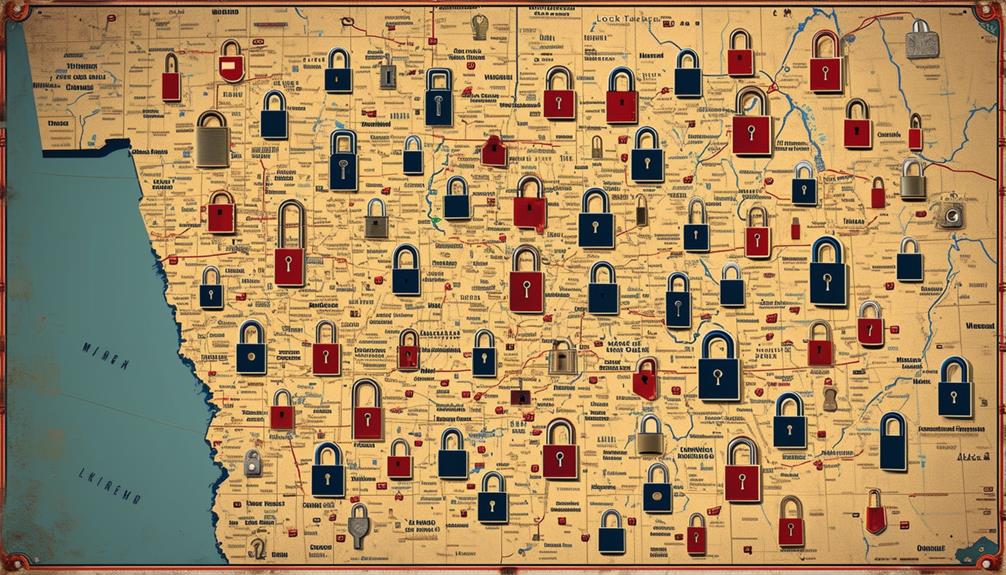
Curious about the lock picking laws in Alabama? In Alabama, state-specific lockpicking regulations exist to guarantee the safety and security of individuals and properties.
It's important to note that possessing lock picking tools with the intent to commit a crime is illegal in Alabama. However, if you're a locksmith, law enforcement personnel, or someone with a valid reason for owning lock picking tools, you're generally allowed to possess them.
Understanding the legal requirements and restrictions for lock picking in Alabama can help you navigate these laws effectively.
When it comes to practicing lock picking as a hobby or profession, it's essential to understand the laws and regulations in Alabama to avoid any legal repercussions.
Always make sure that you're using your lock picking skills responsibly and ethically. Remember, ignorance of the law isn't a valid defense if you find yourself in a legal situation regarding lock picking activities.
California
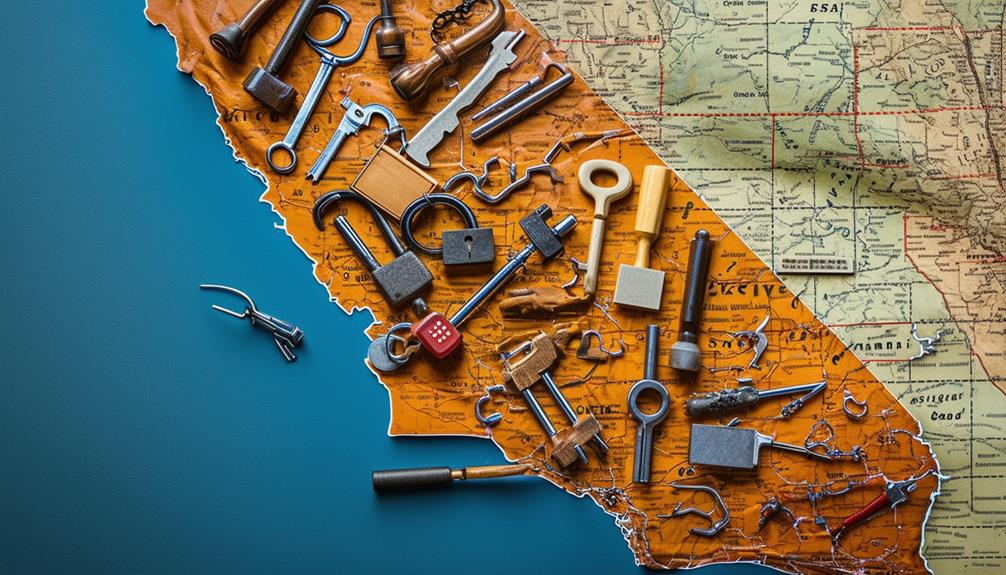
Lock picking laws in California are stringent and aimed at ensuring the safety and security of individuals and properties.
It's essential for aspiring lock pickers to understand the ethical considerations of the craft, as outlined in Unlocking Ethics.
When it comes to lock picking legality, California has specific regulations in place to prevent unauthorized access and protect against potential criminal activities.
Here are some key points to keep in mind regarding lock picking laws in California:
- Possession of lock picking tools with intent to commit a crime is illegal.
- Lock picking tools are classified as burglary tools under California law.
- Unauthorized possession of locksmithing tools can lead to criminal charges.
- Lock picking is only legal if performed by licensed locksmiths or individuals with explicit permission.
Florida
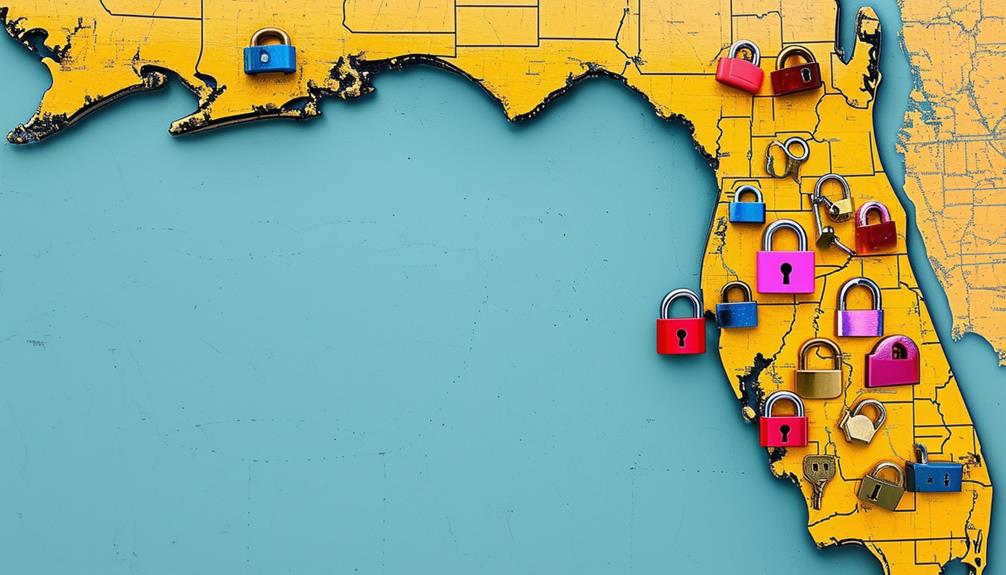
In the state of Florida, regulations surrounding lock picking are designed to maintain the integrity of security measures and deter unlawful activities.
Legal lock picking in Florida is restricted to licensed locksmiths or individuals who've the explicit permission of the owner of the property where the lock is being picked. Engaging in lock picking without proper authorization is considered a criminal offense under Florida law. As a result, understanding the legal risks involved in lock picking is vital for anyone considering this practice, as it can lead to severe legal repercussions if not approached correctly, including fines and imprisonment for unauthorized actions.
Navigating legal risks while practicing lock picking is key to avoiding trouble.
Lockpicking regulations in Florida are outlined in Chapter 810 of the Florida Statutes, which governs burglary and trespassing. According to these laws, possessing lock-picking tools with the intent to commit a crime such as burglary is illegal and punishable by fines and potential imprisonment.
It's important to understand and adhere to these regulations to avoid legal consequences and uphold the safety and security of properties in the state.
If you aren't a licensed locksmith, it's important to refrain from engaging in lock picking activities unless you have obtained explicit permission from the property owner. Always respect the laws and regulations in place to guarantee the protection of individuals and their belongings in Florida.
New York

When it comes to lock picking regulations, New York has stringent laws in place to prevent unauthorized access to properties.
Understanding the legal aspects of lock picking in the state is vital to avoid any unintended legal consequences. For hobbyists, it's important to be aware of the implications of owning lock picking tools, especially in light of the legal aspects of lock picking.
Here's what you need to know about lock picking laws in New York:
- Possession of Lock Picking Tools: In New York, it's illegal to possess lock picking tools with the intent to use them unlawfully.
- Unauthorized Entry: Using lock picking tools to gain unauthorized access to a property, even if no theft or damage occurs, is considered a criminal offense.
- Exceptions for Professionals: Locksmiths and other authorized professionals are exempt from these laws when carrying out their legitimate duties.
- Penalties: Violating lock picking laws in New York can result in criminal charges, fines, and even imprisonment depending on the circumstances.
Make sure to familiarize yourself with the specific regulations in New York to stay compliant with the U.S. lock picking laws.
Texas
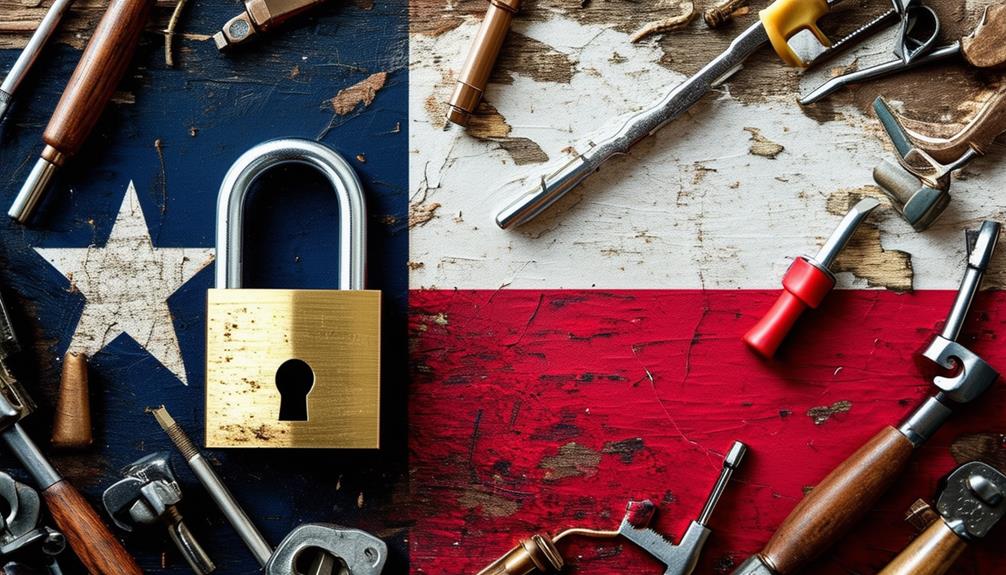
Steering through the legal landscape of lock picking varies across states, and Texas is no exception. In Texas, the laws regarding lock picking are governed by the Texas Occupations Code, Chapter 1702, regulating locksmiths in the state. It is essential to understand the legalities surrounding lock picking to avoid any inadvertent violations. Below is a table outlining key points of the U.S. locksmith laws as they pertain to Texas:
| Texas Locksmith Laws | |
|---|---|
| Licensing | Required |
| Legal Age | 18 years old |
| Criminal Background Check | Mandatory |
| Training | Required |
| Penalties | Fines, Imprisonment |
Ensuring compliance with these regulations is vital for locksmiths operating in Texas. By abiding by the state laws, locksmiths can protect their businesses and uphold the integrity of their profession. If you are considering pursuing a career in locksmithing in Texas, familiarize yourself with these laws to operate within the legal boundaries.
Frequently Asked Questions
Can Lock Picking Tools Be Legally Purchased in These States?
Yes, lock picking tools can legally be purchased in some states, but it's crucial to understand the specific laws in your area.
Make sure to research the regulations regarding lock picking tools to stay compliant.
Always remember to use these tools responsibly and only for lawful purposes.
Stay informed about the legalities in your state to avoid any potential legal issues.
Are There Any Specific Restrictions for Owning Lock Picking Tools?
When it comes to owning lock picking tools, some states do have specific restrictions in place.
These rules can vary widely, so it's crucial to check your local laws.
Remember, ignorance isn't a valid excuse if you end up on the wrong side of the law.
What Are the Penalties for Illegal Possession of Lock Picking Tools?
If you're caught with lock picking tools illegally, you could face serious penalties.
Possessing these tools without a legitimate reason can lead to criminal charges. Penalties vary by state but might include fines, probation, or even jail time.
It's essential to understand the laws in your area to avoid any legal trouble. Always use lock picking tools responsibly and within the boundaries of the law to prevent any consequences.
Do These States Have Any Specialized Training Programs for Lock Picking?
Ever wonder if some states offer exclusive lock-picking training programs?
Well, guess what? They do! Not every state has them, but for those that do, these specialized programs can be a game-changer for honing your skills.
So, if you're itching to up your lock-picking game, keep an eye out for these unique opportunities in select states.
Who knows, you might just release a whole new level of expertise!
Are There Any Exceptions for Locksmiths or Security Professionals?
Exceptions exist for locksmiths or security professionals in some states, allowing them to possess lock picking tools for professional use.
These individuals typically must meet specific licensing requirements and adhere to regulations governing their industry.
It's essential for locksmiths and security professionals to stay informed about the laws and regulations in their state to guarantee compliance and avoid legal issues related to possessing and using lock picking tools.
Conclusion
To summarize, remember to always be aware of lock picking laws in your state to avoid potential legal consequences. For example, imagine the stress and frustration of being caught picking a lock in California and facing criminal charges. Stay informed and stay safe.

